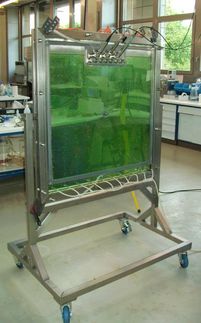Milk goes green
Cows fed biotech product reduce agriculture's environmental impact
Producing milk uses large quantities of land, energy and feed. But cows that receive a biotech product called rbST give more milk, easing natural resource pressure and reducing environmental impact, according to a Cornell study.
The carbon hoofprint is being reduced by a biotech product used on American farms for nearly 15 years called recombinant bovine somatotropin.
The Cornell-funded research found that giving rbST to one million cows would enable the same amount of milk to be produced using 157,000 fewer cows than in a non-supplemented population. This would conserve 491,000 metric tons of corn, 158,000 metric tons of soybeans and reduce total feedstuffs by 2.3 million metric tons. Producers could reduce cropland use by 219,000 hectares and reduce soil erosion by 2.3 million tons annually.
"Supplementing cows with rbST on an industrywide scale would improve sustainability and reduce the dairy industry's contribution to water acidification, algal growth and global warming," said Judith L. Capper, Cornell postdoctoral researcher and lead author of the research paper, published in the June 30 issue of the Proceedings of the National Academy of Sciences.
In 2007 there were 9.2 million cows in the United States. For every one million cows supplemented with rbST, the world would see an environmental saving of 824 million kilograms of carbon dioxide, 41 million kilograms of methane and 96,000 kilograms of nitrous oxide. This reduction in the carbon footprint is equivalent to removing approximately 400,000 cars from the road or planting 300 million trees, Capper wrote.
Her co-authors are Dale E. Bauman, Cornell professor of animal science and the corresponding author; Euridice Castaneda-Gutierrez, former Cornell postdoctoral researcher; and Roger A. Cady, of Monsanto Co., St. Louis.
"Sustainability is important in agricultural production, with an emphasis placed upon meeting human food requirements while mitigating environmental impact," said Bauman. "This study demonstrates that use of rbST markedly improves the efficiency of milk production, mitigates environmental impact including greenhouse gas emissions and reduces natural resource requirements, such as fossil fuel, water and land use."
Topics
Organizations
Other news from the department science

Get the life science industry in your inbox
By submitting this form you agree that LUMITOS AG will send you the newsletter(s) selected above by email. Your data will not be passed on to third parties. Your data will be stored and processed in accordance with our data protection regulations. LUMITOS may contact you by email for the purpose of advertising or market and opinion surveys. You can revoke your consent at any time without giving reasons to LUMITOS AG, Ernst-Augustin-Str. 2, 12489 Berlin, Germany or by e-mail at revoke@lumitos.com with effect for the future. In addition, each email contains a link to unsubscribe from the corresponding newsletter.


















































